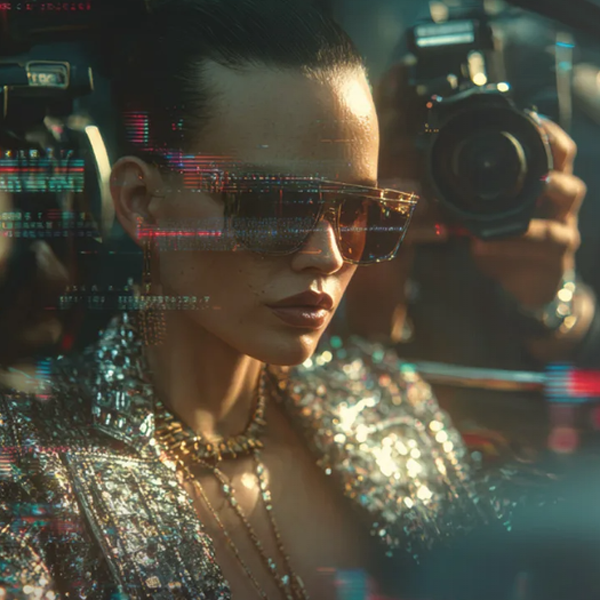 Marco Venuti | IAM Enablement & Acceleration Director
More About This Author >
Marco Venuti | IAM Enablement & Acceleration Director
More About This Author >
 Marco Venuti | IAM Enablement & Acceleration Director
More About This Author >
Marco Venuti | IAM Enablement & Acceleration Director
More About This Author >
AI is here to stay. That much is clear. But have we already crossed the line where fake feels real? If not, we’re on the edge.
The celebrities who don’t exist
Velvet Sundown has over a million monthly listeners on Spotify, but the band doesn’t tour or sleep. It doesn’t even exist. The group, “not quite human, not quite machine”, is entirely AI-generated. Its lyrics, melodies, and even personas are conjured by code. Yet people are streaming it like any other pop act.
Then there’s Mia Zelu. The it-girl shown at Wimbledon this year, looking effortlessly glamorous, surrounded by admirers. Social media lit up, with speculations about her stylist and skincare routines. However, Mia Zelu is not real. She’s a synthetic influencer. Her perfection is generated by AI.
Big-name artists do it, too. In 2023, David Guetta used AI to mimic Eminem’s voice. “Meet Emin-AI-em,” he told the crowd, and they lapped it up.

Even Vogue advertorial dabbled in synthetic beauty, featuring an AI-generated model. The backlash was swift. Critics said it was the final blow to realistic beauty standards. After all, when even the superhumans are now post-human, what chance do we mere mortals have?
Is this the new pop culture landscape: fame without a face and stars that will never age, err, or die?
Identity, imitation, and the synthetic self
We live in a time where being a person is no longer a prerequisite for becoming a celebrity.
And yet, for all the novelty, the emergence of AI-generated influencers and artists forces uncomfortable questions. Who are we really following? What are we really hearing? Do we care?
The lines between human and synthetic influence are blurring every day. As synthetic identities become more lifelike, the old cultural filters (instinct, gut feel, reputation) start to falter. We seem to have entered a strange new phase of collective hallucination.
This matters. Of course, pop culture is still entertainment, but it’s also a mirror. It shapes how we see ourselves and others. If AI-generated fame and digital perfection become the standard, culture will become warped, and we will lose the shared reality that holds us together.
While AI can mimic and even surprise, can it suffer? Can it weep? Can it paint an artwork like Munch’s famous “The Scream”? Or turn Beethoven’s silence into symphonies?
Probably not.
And perhaps it shouldn’t. Maybe it’s enough that AI handles the parts of life we don’t want. Let it process spreadsheets and route deliveries. Let it optimize logistics, summarize meeting notes, and do our taxes. Let it free us up to be the Da Vincis and the Mozarts.
Unfortunately, AI doesn’t stay in its lane. It leaks into identity and trust.
In 2025, deepfake sophistication, especially in the finance sector, skyrocketed; hyper-realistic voice clones, face-swapped videos, and entire personas built to deceive. Fake CEOs, fake romance scams, fake emergencies that sound real enough to get hold of our bank savings.
So, while we muse over the aesthetics of synthetic fashionistas, there’s something deeper running beneath it all, the fact that vigilance is no longer optional. Knowing what’s fake is a life skill.
In the age of artistic “sampling,” where is the line between homage and theft? If someone can clone your voice, face, and style, do they own a part of you?
The answer is still murky.
Beyond fake: A post-peality era?
The idea of “real” is already fraying. Not just in headline-grabbing deepfakes, but in subtler ways. We draft talks, form ideas, and shape sessions with AI, letting it push us into places we might not have reached on our own.
This raises a question: when we listen to someone, are we hearing them, or an AI-augmented echo of them?
It’s not a stretch to say AI is “tampering” with our Theory of Mind, the foundation of human interaction. If so, should we simply accept that we are living in a “post-reality” era, where everything might be fake? And if so, should we even call it “fake”? Perhaps that word (heavy with negativity) is just a relic of our transition into whatever comes next.
The age of synthetic fame
Yet apathy can never be a strategy. We cannot afford to shrug our way through the AI revolution. Not when the same algorithms that produce incredible pictures and music can also produce fake CEOs, fake investors, or even fake lovers.
We have a collective responsibility to protect art and identities from being copied, as well as ourselves, our institutions, and the scaffolding of trust on which our lives are built.
Awareness is everything in an uncertain future. We don’t know where synthetic fame is heading, but we do know this: being human still means something. In an era when fakes are flourishing, maybe the most radical thing we can be is real.